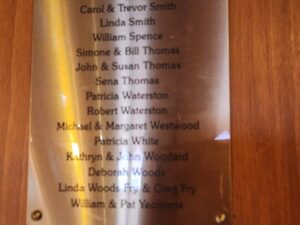All Saints’, Dorval
Michael Westwood
April 5, 2025

Meg and Michael’s names on the list of donors to the St. Mark’s organ restoration project in 2011.
“For the trumpet will sound, and the dead will be raised imperishable, and we will be changed.”
If you’re a musician like Michael Westwood was, you’ve already starting humming Handel’s music to these words.
Music is a language that can bring us closer to God more quickly than almost any other. It speaks to our souls, with or without words. And Michael Westwood was an amateur organist; he played the instrument with arguably the widest range of any in the ensemble, in terms of both sheer volume, and the sounds it can produce and the emotions that go with them.
Michael’s own life was a composition in many different keys. He lived in four countries; his sons were born in three different cities. He was an educator as well as a physician, and not one to shy away from a challenge; he worked hard on behalf of adolescents, focusing on those affected by eating disorders and addiction. As well as music, his interests included skiing, golf, reading, cooking and travel. And of course, his family was always central.
By the time I met Michael seven years ago, when he was a faithful member of the congregation at our early 8 am service here at All Saints’, his neurological condition had already progressed to the point that it was very difficult for him to say more than a few laborious words at a time. I will always regret the conversations we missed out on because of that; I’m sure we would have covered many fascinating topics.
But even if we couldn’t have a nice chat after the service, it was always a pleasure to see Michael’s smiling face, and more seriously, it was a joy to observe his faithfulness in coming to worship, in hearing God’s word, in sharing God’s greeting and peace with the other members of the congregation, and in gathering around this altar to receive God’s body and blood in the form of bread and wine. Those actions spoke volumes, even from a man who was otherwise prevented from expressing himself.
In our gospel reading for today, two of Jesus’ disciples encounter him on the road home, mere hours after he has risen from the dead. They don’t know who he is, though, until they sit at table with him and they break the bread together.
Gathering around a table – and especially around this table – reveals to us who we are. We share a meal – bread and wine – and in doing so are connected not only to each other, but to all those who have shared this meal around this table before. In the church, we call that the “communion of saints”. Michael is here with us today as we worship, just as he was, week in, week out, for so many decades here in this congregation.
And the meals we share together find their meaning in this meal – the funeral reception that will follow this service; the parish suppers in the basement of this building; the times that Michael cooked for Meg, and for his kids and grandkids, friends and siblings, nieces and nephews.
As a musician, as a healer, as a father, as a cook and host – so much of what Michael did and who he was, reflected God’s love and action in the world.
It’s always startling when someone we love dies. Even after a long, full life, even when there is some warning. They were there, and now they’re not, and yet the love, the memories, the legacy, have not changed. And it is those enduring things – the love, the memories, the legacy – that sustain us in our grief.
And none of those things are lost. Everything that Michael was, the gifts he shared, the skills he honed, the love he gave: all of that endures. Indeed, it is transformed and enlarged in the life he now lives before the God who made him and who gave him the talents that he used so well in life. And now that the trumpet has sounded for him, what was mortal in him is transformed into immortality, as Paul states so eloquently.
None of this means that Michael’s loss does not hurt. For those of us still living this mortal life, it is right to grieve when someone who had played God’s song for us is no longer here to sing it in person. But the song does not, cannot end. As the words of the Commendation put it: “Weeping over the grave, we make our song, alleluia, alleluia, alleluia.”
By the grace of God, in death we are not ended, but changed: the perishable puts on imperishability, and we see the risen Christ face to face. Having eaten at God’s table all our lives, in our death we are swallowed up in victory and welcomed to the table where God invites us to feast forevermore.
Amen.
Leave a Reply